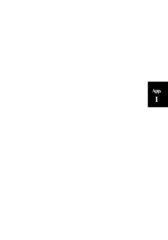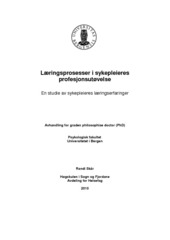| dc.contributor.author | Skår, Randi | |
| dc.date.accessioned | 2010-05-07T09:54:43Z | |
| dc.date.available | 2010-05-07T09:54:43Z | |
| dc.date.issued | 2010-01-25 | eng |
| dc.identifier.isbn | 978-82-308-0946-4 (print version) | eng |
| dc.identifier.uri | https://hdl.handle.net/1956/3914 | |
| dc.description.abstract | Professional practice is characterised by several demands connected to the concepts of alteration, renewal and improvement. To meet these demands, more knowledge is needed concerning how professionals continue learning throughout their working life. The overall aim of this thesis is to contribute to research-based knowledge about how nurses learn in relation to their work environments. Therefore, the meaning of learning processes in nurses’ professional practice is investigated. The project is based on two interview meetings with eleven nurses. First, the nurses participated in in-depth interviews; after three months, the same nurses participated in focus group interviews. A qualitative hermeneutic approach guided the research process and the analysis and interpretation of the transcribed interview-texts. The interviews explore how nurses in different workplaces experience their professional qualifications and challenges in daily work, and the findings are interpreted and discussed in three articles that constitute the core of this thesis. The findings show that nurses need to learn and stay abreast of new developments in nursing in order to manage their responsibilities related to patient care. For the nurses, being autonomous means being knowledgeable and confident in work situations where they are responsible (Article I), and using knowledge connects to their ability to get involved in and assess particular situations (Article II). The understanding of work as a learning environment is connected to how nurses elect to engage in their workplaces and how their workplaces regulate their participation in activities and interpersonal relations (Article III). The theoretical framework of this thesis is inspired by the sociocultural perspective that people learn through their participation in social practices. Theories on professional learning highlight the connection between the individual and the sociocultural in learning processes. Accordingly, it is of interest both how and why people learn and how and why situations affect learning. Theories within this framework emphasise that personal learning histories, dispositions and engagement influence on how people learn in relation to social and cultural practices. These theories correspond with Gadamer’s hermeneutical philosophy, which emphasises that knowledge is constructed between people. According to Gadamer knowledge arises through being-in-the-world, of past and present, and is shaped by the tradition in which we live. Through an overall interpretation of the findings in the three articles, this thesis discusses the coherent meaning of learning processes in nursing practice. The findings show that learning processes connect to how nurses participate in work situations and how changes in their knowledge and actions relate to the contexts in which they learn. An overall finding is connected to the meaning of personal involvement as part of learning. The nurses seem to create their own learning opportunities by engaging in and actively participating in work situations. Accordingly, the nurses learn how to use knowledge and decide what the right action in a particular situation is. In addition, the nurses learn through their involvement in complex and non-routine situations. This means, for instance, learning how to take responsibility in work situations or choosing how to act in particular situations. This thesis discusses how these findings have implications for practice and further research. These implications specifically connect to how to utilise learning situations in clinical studies in nursing education; how nurses’ professional learning connects to the development of professional expertise; and how personal dimensions should be further discussed as part of professional learning in general. | en_US |
| dc.language.iso | nob | eng |
| dc.publisher | The University of Bergen | eng |
| dc.relation.haspart | Paper I: Journal of Clinical Nursing 19(15/16), Skår, R., The meaning of autonomy in nursing practice, pp. 2226-2234. Copyright 2009 Blackwell Publishing. Full text not available in BORA due to publisher restrictions. The published version is available at: <a href="http://dx.doi.org/10.1111/j.1365-2702.2009.02804.x" target="_blank"> http://dx.doi.org/10.1111/j.1365-2702.2009.02804.x</a> | eng |
| dc.relation.haspart | Paper II: Nurse Education Today 30(2), Skår, R., Knowledge use in nursing practice: The importance of practical understanding and personal involvement, pp. 132-136. Copyright 2009 Elsevier. Full text not available in BORA due to publisher restrictions. The published version is available at: <a href="http://dx.doi.org/10.1016/j.nedt.2009.06.012" target="_blank"> http://dx.doi.org/10.1016/j.nedt.2009.06.012</a> | eng |
| dc.relation.haspart | Paper III: Vocations and Learning 3(1), Skår, R., How Nurses Experience Their Work as a Learning Environment, pp. 1-18. Copyright 2009 the Author. Published by Springer. Reproduced with permission. Published version. The published version is also available at: <a href="http://dx.doi.org/10.1007/s12186-009-9026-5" target="_blank">http://dx.doi.org/10.1007/s12186-009-9026-5</a> | eng |
| dc.title | Læringsprosesser i sykepleieres profesjonsutøvelse. En studie av sykepleieres læringserfaringer | nob |
| dc.type | Doctoral thesis | |
| dc.rights.holder | Copyright the author. All rights reserved | |
| dc.rights.holder | The author | eng |
| dc.subject.nsi | VDP::Medisinske Fag: 700::Helsefag: 800::Sykepleievitenskap: 808 | nob |


